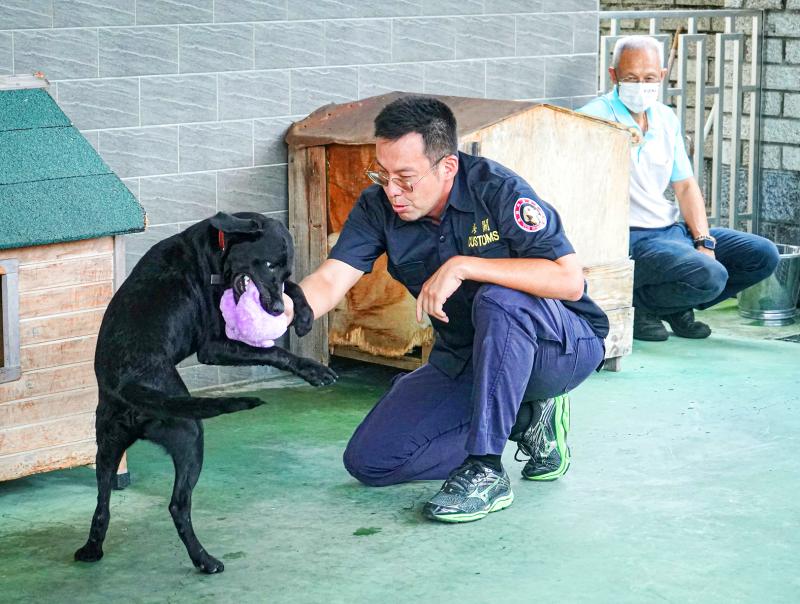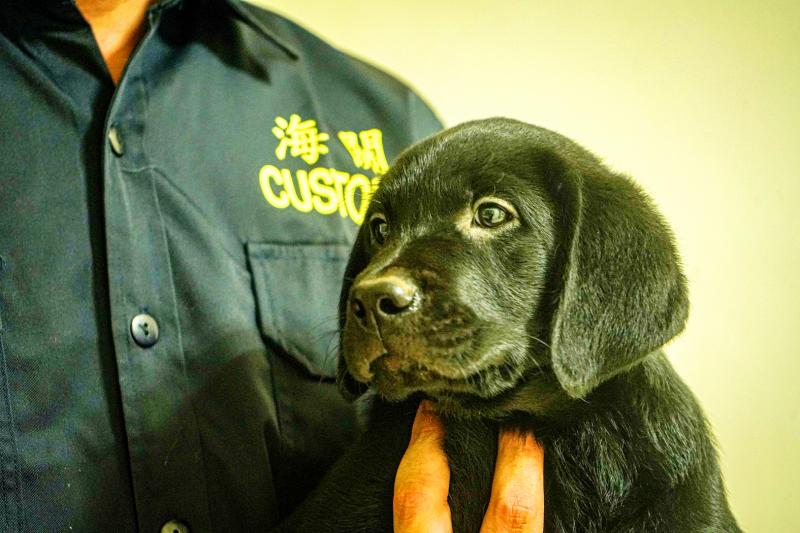Chang Che-pei (張哲培) casually flings a purple dog toy from its hiding place behind his back, sending Wiki flying to retrieve it. The small action sends dog and trainer on a romping game of keep away, tail wagging under the scorching July sun.
The game, familiar to dog lovers everywhere, is actually a key component of Wiki’s training.
“Tug-of-war is not just a game. It will become the reward for an on-duty detection dog when it finds narcotics,” Chang said.

Photo: CNA
For the simple game to work as a reward, a dog’s training must start from birth.
Wiki, still a puppy at five months old, must not be allowed to bond with any humans. Such discipline is necessary to cultivate the focus and independence essential for his future career as a detection dog. With the dog’s socialization closely moderated, allowing Wiki a controlled way to blow off some steam naturally becomes a welcome treat.
Yet Chang must also be disciplined with himself. The toy should be tossed at just the right moment, as Wiki cannot be aware it came from a human. He must then wait for the dog to bite down on the toy before making a sound to keep Wiki’s focus on the game.

Photo: CNA
If the dog learns to love the game itself rather than playing with humans, it can cultivate independence, as well as a desire for the reward, Chang said.
Trainers must also use just the right amount of strength to make the dog believe it won the game, waiting until the dog reaches peak excitement to retrieve the toy. By leaving the dog wanting, it becomes motivation to continue working hard.
Wiki is to begin his formal training in September next year. When the time comes, his toys will be traded for a white towel similar to the one on-duty customs officers use.
If he graduates, Wiki will join the ranks of the nation’s sniffer dogs working to stop illicit narcotics at the border.
Taiwan began investing heavily into its detection dog program in 2007. Aside from an injection of NT$200 million (US$6.69 million), a memorandum of understanding was also signed with Australia on breeding, training and information sharing. Shortly afterward, the Customs Administration set up a 13-hectare training center in Taichung’s Houli District (后里), ready to house Labrador retrievers after Australia’s model.
The Detector Dog Breeding and Training Center is striving to increase its capacity, center official Liu Cheng-chung (劉政忠) said.
As more packages are sent from overseas, the center hopes to train at least 44 officer-dog teams by 2025 to look for narcotics, while also doubling capacity within three years to prepare 100 dogs annually for search-and-rescue, disease detection and more.
The program has already shown results. After beginning training in 2019, sniffer dogs with the Military Police Command found two stashes of marijuana at military training camps. By the end of this year, the command expects to have 18 officer-dog teams on duty.
In the first half of this year alone, more than 146kg of narcotics worth NT$240 million were seized at the nation’s four main ports of entry, 70 percent of the haul from last year in just six months, center data showed.
Formal training for the dogs begins when they are 18 months old. Before then, puppies bred at the center are placed in foster homes from the age of three months until they are about a year old, after which they are returned to Houli to await training.
The dogs undergo three stages of training, trainer Wu Chun-sheng (吳俊昇) said.
During the first preparatory phase, classical and operant conditioning are used to train the dogs to have passive responses toward target objects and the basics of detection.
Dogs and handlers are then paired up for the second course. Over these 13 weeks, the handlers learn to care for the dogs, observe their behavior and learn basic handling skills. Both are evaluated on a weekly basis to determine if they can continue.
Dogs that pass are sent on a six-month rotation to customs inspection zones. After their “internship” is over, they return to the center for two weeks of assessments and additional training to identify new smells.
After all of those stages are complete, only if the handler and dog work well together can they officially join the drug detection team.
Yet the training does not end there, as handlers must continue developing their dogs’ skills and design a new training regime each season, Wu said.
Only about 20 percent of dogs make it through this rigorous course, Liu said, assuring that each canine that joins the team can be considered “the best of the best.”

The inspection equipment and data transmission system for new robotic dogs that Taipei is planning to use for sidewalk patrols were developed by a Taiwanese company, the city’s New Construction Office said today, dismissing concerns that the China-made robots could pose a security risk. The city is bringing in smart robotic dogs to help with sidewalk inspections, Taipei Deputy Mayor Lee Ssu-chuan (李四川) said on Facebook. Equipped with a panoramic surveillance system, the robots would be able to automatically flag problems and easily navigate narrow sidewalks, making inspections faster and more accurate, Lee said. By collecting more accurate data, they would help Taipei

STATS: Taiwan’s average life expectancy of 80.77 years was lower than that of Japan, Singapore and South Korea, but higher than in China, Malaysia and Indonesia Taiwan’s average life expectancy last year increased to 80.77 years, but was still not back to its pre-COVID-19 pandemic peak of 81.32 years in 2020, the Ministry of the Interior said yesterday. The average life expectancy last year increased the 0.54 years from 2023, the ministry said in a statement. For men and women, the average life expectancy last year was 77.42 years and 84.30 years respectively, up 0.48 years and 0.56 years from the previous year. Taiwan’s average life expectancy peaked at 81.32 years in 2020, as the nation was relatively unaffected by the pandemic that year. The metric

TAKING STOCK: The USMC is rebuilding a once-abandoned airfield in Palau to support large-scale ground operations as China’s missile range grows, Naval News reported The US Marine Corps (USMC) is considering new sites for stockpiling equipment in the West Pacific to harden military supply chains and enhance mobility across the Indo-Pacific region, US-based Naval News reported on Saturday. The proposed sites in Palau — one of Taiwan’s diplomatic allies — and Australia would enable a “rapid standup of stored equipment within a year” of the program’s approval, the report said, citing documents published by the USMC last month. In Palau, the service is rebuilding a formerly abandoned World War II-era airfield and establishing ancillary structures to support large-scale ground operations “as China’s missile range and magazine

A 72-year-old man in Kaohsiung was sentenced to 40 days in jail after he was found having sex with a 67-year-old woman under a slide in a public park on Sunday afternoon. At 3pm on Sunday, a mother surnamed Liang (梁) was with her child at a neighborhood park when they found the man, surnamed Tsai (蔡), and woman, surnamed Huang (黃), underneath the slide. Liang took her child away from the scene, took photographs of the two and called the police, who arrived and arrested the couple. During questioning, Tsai told police that he had met Huang that day and offered to